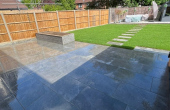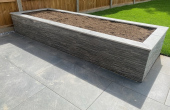Telephone: 0118 229 2486
Home›News›Garden Decking - Wood or Composite? What material is best for you? A Look into Garden Decking.
Garden Decking - Wood or Composite? What material is best for you? A Look into Garden Decking.
Introduction
Garden decking plays an integral role in shaping the aesthetics and functionality of an outdoor space. It’s not just about laying down any material; it's about creating a space that complements the surrounding garden, offering both comfort and style. In the midst of this lies an essential decision - choosing between wood or composite for your decking. Both have their merits, both have their drawbacks. This article delves into the intricacies of each, helping homeowners like yourself make an informed choice that suits not just your garden's needs, but your aesthetic and functional desires too.
Understanding Garden Decking
Every garden has its unique charm. From the blossoming flowers to the chirping birds, these outdoor spaces provide a serene escape from the hustle and bustle of daily life. But, when enhanced with the right decking, a garden’s potential transforms multifold
The Role of Decking in Garden Transformations
Decking acts as a centrepiece, harmoniously bridging the gap between nature and human-made structures. It provides a dedicated space for garden furniture, barbeques, and gatherings. It's not just about adding value to the property; it's about enriching your outdoor living experience. Think about it: a strategically placed wooden deck overlooking a pond or a composite deck surrounding your pool. These additions can dramatically transform any garden into a leisurely haven.
Decking as a Significant Garden Investment
Decking isn't merely an expense; it's an investment – both for your property's value and your lifestyle. Properly chosen and well-maintained decking can last for years, offering the perfect return on investment not just in monetary terms, but also in the quality of life and memories created.
But with a myriad of choices, how does one decide between wooden and composite decking?
Wooden Decking
For decades, wood has been the traditional choice for garden decking in homes across Berkshire and beyond. Its natural allure, warmth, and versatility have made it a classic favourite. But like all materials, wooden decking comes with its sets of advantages and disadvantages.
Brief Overview of Wooden Decking
Wooden decking typically consists of timbers like pine, cedar, or redwood. Each of these woods has its characteristics in terms of colour, grain, and durability. The timeless appeal of wood lies in its authentic, rustic look, seamlessly blending with the garden’s natural surroundings.
Pros and Cons of Wooden Decking
Pros:
Natural Aesthetics: Wooden decks offer an unparalleled natural aesthetic. Their organic look and feel can instantly elevate the charm of any outdoor space.
Customisation: Wood can be painted, stained, or varnished to suit personal preferences, offering homeowners a broad spectrum of design options.
Thermal Comfort: On hot summer days, wooden decks are less likely to become too hot, providing a more comfortable underfoot experience.
Cons:
Maintenance: Wooden decks require regular maintenance. This includes staining or sealing every couple of years to protect against moisture, fading, and wear.
Durability Concerns: Wood is susceptible to termites, rot, and warping, especially if not properly treated or maintained.
Cost: Over time, maintenance costs can accumulate, making it a potentially more expensive option in the long run.
Maintenance, Durability, and Longevity
To ensure that a wooden deck lasts and remains appealing, homeowners need to invest time and effort in its maintenance. This might involve regular cleaning, occasional staining or sealing, and ensuring proper drainage to prevent water accumulation. When well-maintained, wooden decks can serve homeowners for years. However, the longevity varies depending on the type of wood used and the prevailing environmental conditions.
Styles, Colour Options, and Finishes Available
Wooden decking offers versatility in design. From light-coloured pine that gives a contemporary feel to the rich, dark tones of mahogany that exude luxury - there's a wood type for every taste. Furthermore, homeowners have the freedom to paint, stain, or varnish their decks, adapting them to evolving style preferences or garden redesigns.
In conclusion, wooden decking remains a prominent choice for those who value authenticity, tradition, and the unmistakable charm of natural wood. However, it demands care and attention to keep it in its prime. As modern alternatives like composite decking gain traction, it’s essential to weigh the pros and cons of both.
Composite Decking
Composite decking represents a blend of wood fibres and recycled plastics, a combination resulting in a robust and long-lasting decking material. Increasingly popular in areas such as Berkshire, composite decking brings a modern flair to outdoor spaces, all while offering numerous benefits that address many of the shortcomings associated with wooden decking.
Brief Overview of Composite Decking
Composite decking is characterised by its durability and low maintenance requirements. Available in a variety of colours and finishes, it replicates the look of real wood without the associated upkeep. Its manufacturing process is designed to resist fading, staining, scratching, and mould – attributes that give it an edge, especially in the damp British climate.
Pros and Cons of Composite Decking
Pros:
Low Maintenance: No need for regular painting, staining, or sealing. An occasional wash is all that’s required to keep a composite deck looking pristine.
Durability: Highly resistant to rot, mould, termites, and warping, ensuring the deck remains intact for years.
Eco-friendly: Often made from recycled materials, composite decking is an environmentally friendly choice.
Consistent Appearance: Unlike wood, which can have variations in grain and colour, composite decking offers consistency in appearance.
Cons:
Initial Cost: The upfront cost for composite decking can be higher than wood. However, when considering the long-term maintenance savings, many homeowners find it economically viable.
Heat Retention: In extremely hot conditions, some types of composite decking can become quite warm to the touch.
Less Authentic: While modern composite decking closely mimics the look of real wood, some purists believe it lacks the genuine charm of timber.
Maintenance, Durability, and Longevity
Composite decking's major selling point is its minimal maintenance needs. Homeowners can bid farewell to regular staining, sealing, or painting. The material is built to withstand the elements, offering a lifespan that often exceeds 25 years with proper care.
Styles, Colour Options, and Finishes Available
From muted greys to vibrant reds, composite decking comes in a range of colours, allowing homeowners to find the perfect match for their garden's aesthetic. Additionally, various finishes mimic the texture and grain of natural wood, ensuring the deck doesn’t just look the part but feels it too.
In essence, composite decking offers a modern solution for homeowners looking for durability and minimal maintenance. While it might not replicate the authentic touch and feel of wood to perfection, its array of benefits make it an increasingly popular choice, especially for those who wish to invest in their outdoor spaces for the long haul.
Comparative Analysis: Wood vs. Composite
So…the big question: should one opt for wooden or composite decking? This comparative analysis dives deep, providing a detailed juxtaposition of the two materials, helping homeowners make an informed choice.
Aesthetics and Appearance
Wood: The timeless beauty of wood is unparalleled. With its natural grain, variations in shade, and potential to be painted or stained, wooden decking offers a classic, authentic charm that blends effortlessly with most garden designs.
Composite: Modern composite decking can closely mimic the look of wood. While it may lack the exact tactile experience of timber, its consistency in colour and texture provides a sleek, modern look suitable for contemporary garden designs.
Maintenance and Upkeep
Wood: Wooden decking requires a significant amount of upkeep. Regular sealing or staining is essential to prevent moisture damage, fading, and wear. Maintenance intervals might be shorter, especially in the UK’s damp climate.
Composite: Almost maintenance-free, composite decking needs just the occasional wash. The absence of regular staining or sealing means homeowners can enjoy their outdoor space without the looming tasks of upkeep.
Cost Over Time
Wood: The initial costs of wooden decking might be lower, but the recurring expenses of maintenance can make it pricier in the long run
Composite: While the upfront investment is typically higher than wood, the long-term savings on maintenance mean that over its lifespan, composite decking can often be more cost-effective.
Durability and Lifespan
Wood: With meticulous maintenance, wooden decks can last beyond 15 years. However, they are susceptible to issues like rotting, termites, and warping.
Composite: Built for longevity, composite decks can last 25 years or more. Their resistance to common decking issues ensures they remain sturdy and appealing for extended periods.
Environmental Considerations
Wood: While wood is a natural material, concerns arise from the source of timber and deforestation. Opting for sustainably sourced wood can mitigate these environmental concerns.
Composite: Often made from recycled materials, composite decking reduces the carbon footprint. Its longer lifespan also means reduced frequency of replacement, furthering its eco-friendly credentials.
Conclusion
Choosing between wood and composite decking is not just about aesthetics; it's a decision influenced by factors like maintenance, cost, durability, and environmental impact. For those who value tradition and the tactile experience of natural wood, timber decking is a fantastic choice. However, for homeowners seeking longevity, reduced upkeep, and a modern aesthetic, composite decking has emerged as a formidable contender.
For residents of Berkshire, the team at Daniel Moquet provides expertise in both wooden and composite decking, guiding homeowners to make choices that best suit their needs and preferences.









 Over 40 years of experience working collectively
Over 40 years of experience working collectively A 'Quality Service Guarantee'
A 'Quality Service Guarantee' Premium industry-leading products
Premium industry-leading products